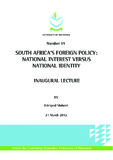Please use this identifier to cite or link to this item:
http://hdl.handle.net/10311/1300Full metadata record
| DC Field | Value | Language |
|---|---|---|
| dc.contributor.author | Mahant, Edelgard | - |
| dc.contributor.author | Costa, Sara | - |
| dc.date.accessioned | 2014-12-03T09:03:42Z | - |
| dc.date.available | 2014-12-03T09:03:42Z | - |
| dc.date.issued | 2012-03-21 | - |
| dc.identifier.citation | Mahant, Edelgard & Sara Costa (2012) South Africa's foreign policy: national interest versus national identity, Inaugural Lecture No. 19, pp 1-58 | en_US |
| dc.identifier.isbn | 978 99912 485 8 5 | - |
| dc.identifier.uri | http://hdl.handle.net/10311/1300 | - |
| dc.description.abstract | When Nelson Mandela became President of South Africa, he announced that human rights would become the light which would guide South Africa’s foreign policy but, when he tried to implement such a policy, the newly democratic country found itself isolated among African states. When Mandela sought to impose sanctions on Nigeria after the execution of Ken Saro-Wiwa and nine other opposition leaders, no other African government would support him. Thabo Mbeki, who replaced Mandela in 1999, proudly proclaimed, “I am an African”. He sought to work with other African governments, no matter how unsavoury their democratic credentials. His government tried to mediate the conflict in the Democratic Republic of Congo and maintained good relations with Zimbabwe as that country slid into chaos. Most recently, the South African government has helped to prevent Sudan’s President Omar El-Bashir from being brought before the International Criminal Court. What caused such a rapid change in the foreign policy of a newly democratic country? Using the theoretical framework of constructivism, I argue that it was the desire of the Mbeki regime to make South Africa a leader among African states rather than the pursuit of strategic or economic interests that led to the change in policy. This is a good example of identity politics and the search for prestige! | en_US |
| dc.description.sponsorship | University of Botswana | en_US |
| dc.language.iso | en | en_US |
| dc.publisher | Centre for Continuing Education, University of Botswana, http://www.ub.bw | en_US |
| dc.relation.ispartofseries | Inaugural Lecture Series;No. 19 | - |
| dc.subject | South Africa | en_US |
| dc.subject | Foreign policy | en_US |
| dc.subject | Democratic | en_US |
| dc.subject | Constructivism | en_US |
| dc.subject | Mandela | en_US |
| dc.subject | Mbeki | en_US |
| dc.subject | African | en_US |
| dc.subject.lcsh | South Africa/foreign policy | en_US |
| dc.title | South Africa's foreign policy: national interest versus national identity | en_US |
| dc.type | Inaugural Lecture | en_US |
| dc.rights.holder | Centre for Continuing Education, University of Botswana | en_US |
| Appears in Collections: | Inaugural Lecture Series | |
Files in This Item:
| File | Description | Size | Format | |
|---|---|---|---|---|
| Inaugural Lecture_MahantFINAL.pdf | 1.47 MB | Adobe PDF |  View/Open |
Items in DSpace are protected by copyright, with all rights reserved, unless otherwise indicated.
